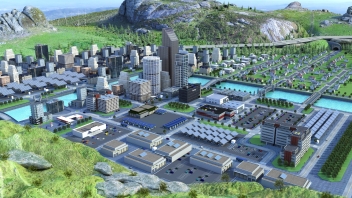Schneider Electric
Schneider Electric is a company offering energy and automation digital solutions for efficiency and sustainability.
See below for the Latest Schneider Electric News, Analysis, Profit Results, Share Price Information, and Commentary.
How sustainability can differentiate your brand and increase commercial building value
As the world economy recovers from the impacts of the COVID-19 pandemic, building owners and operators are facing a range of new challenges. This post will discuss how making your buildings more sustainable can help you meet these challenges by strengthening your brand.
How sustainability can differentiate your brand and increase commercial building value
As the world economy recovers from the impacts of the COVID-19 pandemic, building owners and operators are facing a range of new challenges. This post will discuss how making your buildings more sustainable can help you meet these challenges by strengthening your brand.
The importance of highly available industry edge solutions
Around the world, edge computing is emerging as a linchpin of digital transformation initiatives. From remote locations within airports, seaports, or transportation networks for rail or road traffic, to dangerous or inhospitable niches located on factory floors, IT infrastructure is increasingly deployed to support the multitude of digital systems making their way into our lives.
Why system-wide resilience is crucial for colocation providers
Delivering high-reliability data centre operations is vital to cloud and colocation service providers. This is hardly surprising, considering how service quality is typically seen as a crucial factor for them to achieve growth and profitability. However, attaining high service quality standards isn’t as straightforward as it sounds.
Using smart building technology to create healthy, productive, and sustainable workplaces
Whilst the global pandemic forced many companies to require employees to work from home, a large percentage of those people have discovered that they like it. Many have appreciated the lack of daily commute and the flexibility to be with their families. Global Workplace Analytics has stated that “Before the crisis, surveys repeatedly showed 80% of employees want to work from home at least some of the time. Our best estimate is that we will see 25-30% of the workforce working at home on a multiple-days-a-week basis by the end of 2021.”
Digitising the food industry for a post-COVID world
In today’s post-pandemic landscape, the food manufacturing industry is facing a host of new challenges. COVID-19 disrupted supply chains around the world and consumer demand patterns changed rapidly. Over $6.5 billion in customer spending for food and beverages in the United States shifted to retail during the pandemic. In the first two months of the lockdown, an estimated 14 million litres of milk were wasted each day. Productivity gains in manufacturing have fallen from 4.3% in 2000-2007, to just 0.7% in 2007-2018. Consumer demands are rising, and there are stricter regulations focused on food safety, health and environmental sustainability. This is the new normal for the industry, but how can businesses adapt?
How data centres can enhance their sustainability with the right UPS
Demand for colocation is rising, as enterprises turn to hybrid cloud to meet the surge in infrastructure from accelerated digital transformation plans. Indeed, analyst firm Gartner has predicted that end-user spending on global data centre infrastructure will reach US$200 billion in 2021, an increase of 6% over 2020 expenditures.
The Rise of Hyperconverged IT Infrastructure
The quest for increased simplicity, efficiency, and agility, coupled with IT refresh cycles is driving enterprises to hyperconverged IT. Once seen as vital for virtual desktop applications, data centre consolidation and new use cases have resulted in a renewed surge of interest that is serving to bring it into the mainstream.
Climate-friendly heating: can we keep warm without scorching the planet?
It’s said that ‘home is where the heart is. It’s certainly where we are spending the majority of our time – living, working, learning and playing while the pandemic continues. In this new normal, home electricity consumption is set to double by 2050. Simultaneously, we are faced with a moral and economic imperative to reduce CO2 emissions from houses as climate change devastates communities across the world. Net-zero homes is our goal, and it’s one we can’t reach fast enough.
How digital transformation drives sustainability: The fast lane on the road to industrial carbon neutrality
Global warming risks are difficult to address because they are long-term in nature but require short-term action to reduce their impact. As a result, governments across the globe are now imposing targets on manufacturing industries that will force a transition to a low-carbon economy. Industrial organizations, according to the Environmental Protection Agency, are responsible for at least 21% of global greenhouse gas emissions. Therefore, they are under pressure from both consumers and governments to rapidly achieve emissions reduction targets. As a result, many companies are looking to digital transformation as a possible approach for achieving those goals.
Schneider Electric Innovation Day 2021: Uncover the Power of Digitization in Driving Sustainability
The event brings together thought leaders to speak about how digitization is critical in driving business growth and operational stability with sustainability, featuring conservationist and polar adventurer Robert Swan, digital analyst and anthropologist Brian Solis among others.












 Advertise
Advertise


















